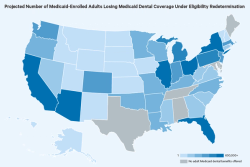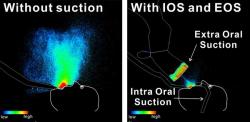- About Us
- Advertise
- Editorial
- Contact Us
- Terms and Conditions
- Privacy Policy
- Do Not Sell My Personal Information
© 2025 MJH Life Sciences™ and Dental Products Report. All rights reserved.
In novel and familiar ways, dental companies help respond to COVID-19
With the dental industry at a standstill, companies such as A-dec, BIOLASE and HuFriedyGroup are finding ways to help overcome shortages of medical equipment and supplies.
The COVID-19 pandemic took the dental industry by surprise, and as the quickly imposed shelter-at-home and business shutdown orders rolled across the United States in March and early April, most dental practices, labs, and product manufacturers saw their workloads almost completely disappear.
This created challenging situations for every dental operation, but even as the industry went into semi-hibernation, the medical community actively treating patients with COVID-19 was facing crucial shortages of personal protective equipment (PPE) and some critical medical devices including ventilators. While there was less opportunity to care for patients’ oral health, the dental industry jumped at opportunities to keep busy while helping overcome these supply issues.
Whether it was the team at A-dec quickly adapting to meet a local need, or BIOLASE leveraging an employee’s connections to partner with a ventilator manufacturer, or the HuFriedyGroup running its production facilities non-stop to keep up with demand, everyone felt a drive to be helpful, and is gratified to have done a little something to help the United States overcome the pandemic.
Making something different
3D printing is an exciting technology, but it’s not the only way to produce things that are in demand, and a number of dental product manufacturers are turning their production capacity away from their traditional products to build items and technologies that are in short supply right now. At A-dec, a conversation with a friend of an employee who works as a nurse got the company to start producing face shields that are needed at her hospital. Meanwhile at BIOLASE, the company leveraged connections with a Korean ventilator manufacturer to start producing those in-demand medical devices.
Related article: Largely shut down, the dental industry steps up
For A-dec it took the company less than two weeks from learning about the need for these shields to turn a new facility that was not yet online into a face shield production center, according to A-dec COO Marv Nelson. The company actually had more volunteers for the project than they could realistically have involved in the planning, and they not only began producing the shields quickly, but after taking in feedback from the nurses who use the shields they were able to make design improvements and are now producing approximately 9,500 shields each week.
“We're in production and we're really proud of the fact that we're involved in the fight against COVID, and we've got people that we can keep employed and at the same time do good,” Nelson says. “The thing about A-dec is that everybody here really cares about each other, cares about the community, cares about doing the right thing, and cares about taking care of our customers.”
Of course, the actual logistics of producing these masks and the normal A-dec product lines remains a challenge amidst social distancing orders. A-dec Production Supervisor Jered Billings said adjustments have included spacing out employees, setting up designated walkways, and in some cases installing barriers to keep employees safe while working.
The challenges for A-dec are not only about staff safety. Billings says supply chains for the raw materials they need to make the new face shields have been as erratic as everything else during the pandemic, and he’s learned to acquire resources when they’re available, because they might not be there later.
“It's been a roller coaster actually,” he notes. “As far as the plastics, the plastic supply chain has been eroding by the minute. I think I think the biggest learning is if you can get the material, don't hesitate. Get it while you can. I think the other lesson for me is how supportive the executive team has been in empowering us to help the community.”
At BIOLASE, a partnership with Korean medical device company MEKICS, came about through the experience of BIOLASE team members who previously worked in the medical ventilator industry, and this drive to help during a crisis, says BIOLASE CEO Todd Norbe. The company was able to move quickly because of experience manufacturing in the highly regulated medical device space. The ventilators they make will help patients, and the process of making them is letting the company keep more staff on the payroll during the pandemic.
“Our focus has always been on patients and caring for them in the best possible way with the right technology and felt it was a great opportunity to get our facility and people back to work,” Norbe says. “In this time of global crisis, it is important for everyone to do what they can to support our citizens in the U.S. impacted by the pandemic, and we saw this as an opportunity to do our part.”
The impact on existing manufacturers
The impact of the pandemic on companies that were already in the business of making PPE and infection control products has been just as dramatic, and they’ve been just as eager to be helpful resources during this time. The pandemic really hit the United States while HuFriedyGroup was undergoing an integration following a merger with Crosstex, and unsurprisingly, they’ve experienced a jump in demand for many products. The company obtained special permission from the state of New York to put their New York production facilities on seven-day-a-week production schedules in order to maximize the number of products they can produce, says HuFriedyGroup Chief Marketing Officer Patrick Bernardi.
“This is something that we are very, very proud of,” he says. “We’ve moved to 24/7 manufacturing of our masks and our shields to try and get as much out to the frontlines as we possibly can.”
The company is also busy making sure it is providing the best information they can on infection control regulations and best practices via its online GreenLight Dental Compliance Center™, as well as via online articles, live webinars, and on-demand sessions, says HuFriedyGroup Chief Commercial Officer Jennifer Naylor. The company has also been in touch with the EPA to verify claims about their surface disinfectant products when it comes to COVID-19. Staying up to date with all the changing information, and making sure dental and medical professionals get accurate, up to date information from HuFriedyGroup has been keeping them busy.
“Information is coming fast and furious,” she adds. “One of the things that we kind of have been laughing about here is that CDC guidelines typically change every eight to 10 years, and now we could be getting updates because more and more information is coming in multiple times in a week.”
This is certainly not the spring anyone planned for, and getting dental practices and laboratories back on their feet is going to be a new challenge for the industry, but finding ways to help care for the sick and protect those caregivers has been a worthwhile effort. Now it seems like the industry is ready to tackle that challenge of getting back to the work of providing oral health care.
“Were very much in the beginning, how much information can we get out to the dental practitioners in the field to help them you know, wade through the mountains of information coming out, and how can we chunk it out in easy ways,” Naylor says. “Now we're really focusing on the second part of this, of getting both staff, dental practitioners as well as patients back comfortable getting in the chair.”



